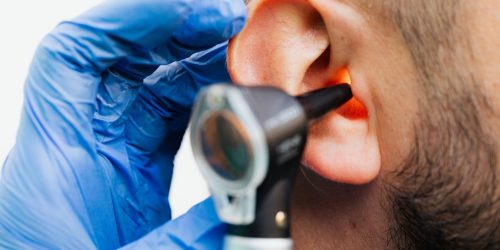What Causes Random Ringing in the Ear for a Few Seconds?
If you’re hearing a random ringing in your ears for a few seconds, don’t worry, you’re not alone. The Centers for Disease Control and Prevention estimates that nearly 15%, or more than 50 million Americans, experience some form of tinnitus. Here’s what tinnitus sounds like, what causes it, how to stop the ringing, and when to seek help.
What Does Tinnitus Sound Like?
Tinnitus is random ringing in the ears for a few seconds or a prolonged period. It sounds different for everyone but is often described as ringing, buzzing, hissing, roaring, whistling, swooshing, or clicking. It can be in one ear or both. The American Tinnitus Association created a sample of typical sounds for tinnitus patients. You can use it as a resource when describing the sound to your doctor.
8 Causes of Tinnitus
The Mayo Clinic and Cleveland Clinic found eight possible causes of tinnitus:
- Hearing Loss
When the hair cells that transmit sensation in your inner ear are damaged, the auditory pathways don’t receive the expected signal, causing you to experience hearing loss. As a result, the brain will produce abnormal nerve signals that sound like ringing.
What to do: See an audiologist who will do hearing tests to determine if the ringing is caused by hearing loss. The Cleveland Clinic says hearing aids not only improve hearing but can also help reduce the awareness of the annoying ringing. - Exposure to Loud Sounds
Like hearing loss, loud sounds, like at a concert or a construction site, can damage the inner ear hair cells and cause the development of tinnitus.
What to do: Wear hearing protection like foam ear plugs or earmuff-style headsets to prevent damaging those hair cells. - Ear Wax
Are your ears feeling clogged and ringing? You might have excessive ear wax. Sometimes ear wax doesn’t always wash away or fall out as it should and accumulates. It eventually can block your ear canal, affecting your hearing and causing a ringing sensation.
What to do: The Mayo Clinic emphasizes that you should not dig it out yourself. Your doctor has special tools that can remove the wax. - Certain Medications
Higher doses of some over-the-counter medications like aspirin, Advil, Motrin, Aleve, and ibuprofen can cause tinnitus. In addition, some antibiotics, antidepressants, and chemotherapy agents can cause ringing too.
What to do: If you take any of these medications and are experiencing ringing, talk to your doctor. - Dental Issues
Some people with temporomandibular joint disorder (TMJ) or who grind their teeth can experience random ringing in their ear for a few seconds.
What to do: To prevent the ringing, try a night guard to stop you from grinding and clenching your teeth while sleeping. - Head Injuries
Injuries like a concussion or whiplash can cause tinnitus. If you were in an accident like a car crash or fell and hit your head and are now experiencing ringing, see a doctor to get checked out.
What to do: Most likely, this symptom will go away as your recover from the injury, but if it doesn’t, see a doctor. - Underlying Medical Conditions
Less common causes of tinnitus can be chronic health conditions. For example, ringing in the ears can be an early indicator of Meniere’s disease, an inner ear disorder that affects hearing and sense of balance. Other conditions that can cause tinnitus include hypertension, diabetes, thyroid problems, and autoimmune diseases. Recently, researchers have been studying the connection between tinnitus and anxiety. A 2020 study found a close correlation between the two. Also, that stress and anxiety can cause tinnitus, although researchers are still unsure why and how tinnitus and anxiety are connected.
What to do: See a doctor for more tests. - Certain Vitamin Deficiencies
Studies have shown certain vitamin deficiencies, like B12 and vitamin D, can cause tinnitus.
What to do: Speak with your doctor. They will probably perform some blood tests to determine if this is the answer to the ringing in your ears.
Let AFC Help
Random ringing in the ears for a few seconds can be a nuisance. It can make it difficult to focus on work or hear what people are saying to you. Often you can’t get into your primary care doctor immediately. So, to find a doctor to help provide immediate relief or answers to the ringing, visit a walk-in urgent care.
Unsure of where one is? Let American Family Care help you. We strive to make doctor visits simple and accessible. We don’t require appointments and are open for extended hours every day. Plus, we have onsite labs to perform any blood work necessary. So, be one step closer to solving the random ringing in your ears for a few seconds by finding an AFC location near you.



